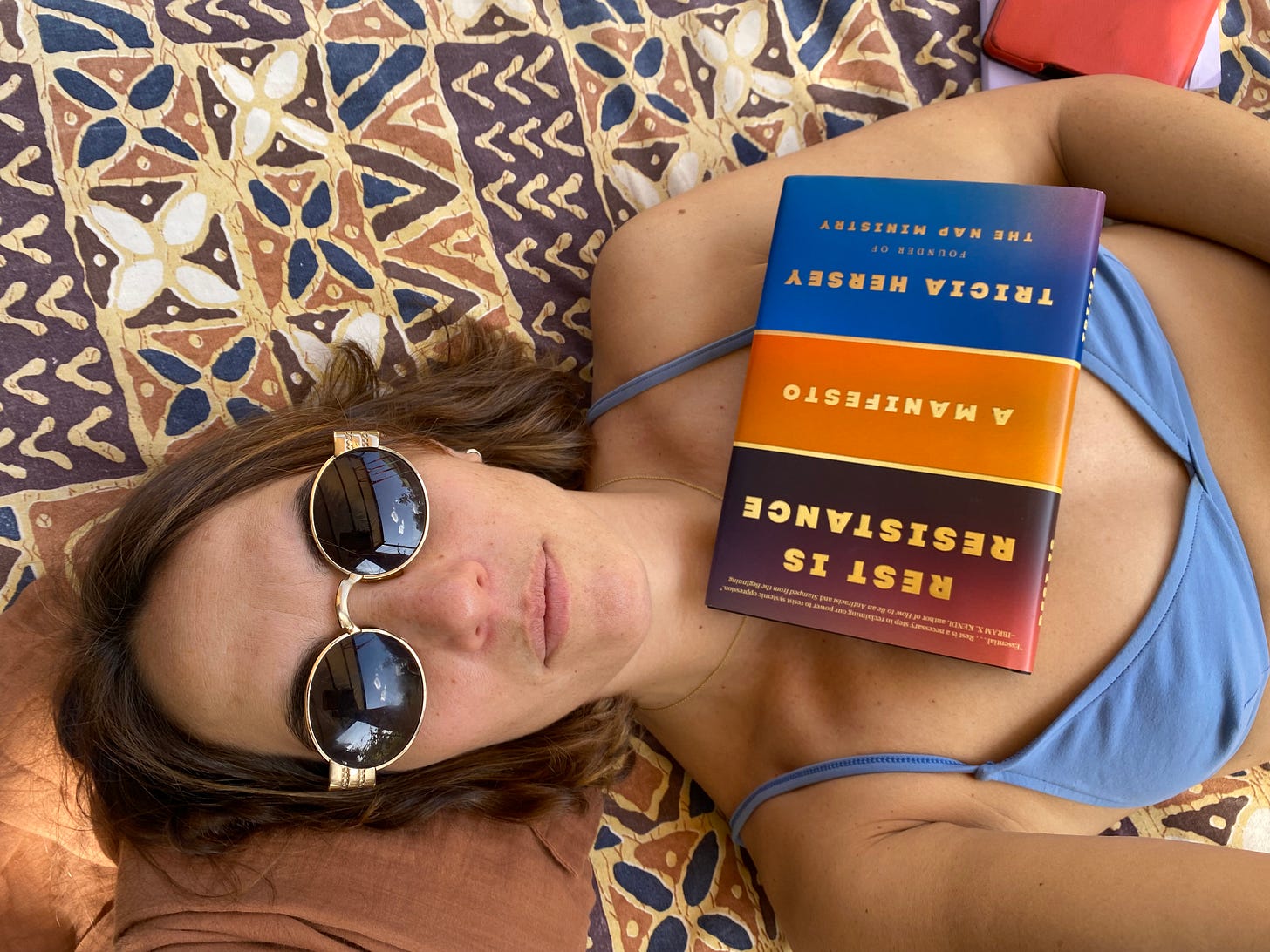In today’s newsletter, I share some thoughts on rest as a radical act. Because everything starts with the personal, I start with my own experience and then weave in teachings of activists, ancestors and plants in the art of slowing down. There is a short practice to embody the topic of this week, a playlist on Slowness, and some interesting interviews and readings to dig deeper. I have some news about this newsletter and a playlist about slowness. Enjoy!
Last week, I came back from a one-month trip to Kenya, the trip was as beautiful as it was overwhelming. We were always on the move, trying to absorb all the things we were discovering, and I often found myself wanting more, or doing three things instead of one because I “had to make the best of it”. On two occasions, I had to tell myself to slow down, to cultivate presence in the things that I was doing rather than think of those I wasn’t doing. I came back to a very very cold Barcelona, with an incredible sensation of wanting to cave, to chill, to winter.
My ability to slow down is often accompanied by guilt. Whilst in my activism I am guided by trust and hope, in my personal life I struggle with slowness, and patience does not come naturally to me. But, in the last years, life has thrown at me a plethora of situations in which I had no choice but to be patient, never have I had to consciously think of slowness this much. So, as I do, I began investigating the political relevance of slowing down. There are currently millions of people who are burned out, trying to make ends meet, or forcing themselves into jobs that leave no space for slowing down. Tell me, who works in a place where even if you have completed your tasks, you stay so as “not to look bad”?
Taking a break, or leaving early, is seen as a lack of commitment to the job, laziness, no drive. I have friends that are so overwhelmed with the pace of their work life, that they cannot even have a coffee with a dear friend (or do and then are constantly sick from exhaustion). I know we are being driven by the ego when it comes to chasing our success, but when did this come at the cost of our love life, our health, and our friendships? Grind culture is killing us. Why are we so afraid to slow down? We need a reframe.
Whenever I advocate for slowness, I am confronted with the privilege that placing boundaries and slowing down can take. Then, I started reading Rest Is Resistance (a book that is a poetic antidote par excellence, and will get its own essay). In it, Trisha Hersey, who is currently on a two-month sabbatical until January, describes how she created what is today known as the Nap Ministry, a movement advocating for rest as an act of resistance, especially for black folks in America.
“I come from a legacy of exhaustion,” she writes “My maternal grandmother, Ora, the muse of this work, a refugee from Jim Crow terrorism, rested her eyes every day for thirty minutes to an hour in an attempt to connect and find peace”. Hersey goes on to explain that she and her siblings and cousins knew that those 30 minutes were sacrosanct and that while grandma Ora was resting her eyes, everyone had to respect her silence. I was in awe of Ora as I read, her commitment to rest was radical, a way to connect, to listen to herself. She made her world quiet so she could hear herself. As a black woman descending from a legacy of exhaustion, Hersey’s work in the Nap Ministry is healing her ancestors.
Let’s face it, our culture loves fast-paced, it loves overworked people. Many of us live with a scarcity mentality and often push ourselves to produce and do more to arrive…where?
As Hersey says, this is even stronger in immigrant families, where folks grow up with toxic programming that says they need to work ten times harder to achieve something. I believe this also happens with women, we grow up knowing we will not make as much money as our male peers, and that in order to achieve greatness we must keep the pace: Be a superwoman! Overworked and underpaid.
Countless times I have talked to my friends about slowing down and resting, saying no, and stopping people pleasing. Many think it is not possible, that it requires more effort than to keep going. We need to change the narrative. Slowing down does not mean quitting your job, it means placing boundaries, being in connection with your body and knowing when it needs rest. Being part of the slowing down movement also involves respecting other people’s rest, and sometimes pushing them to see it when they cannot. You don’t owe anyone an explanation!
An exercise I began to do was to notice where slowing down was happening around me. A toddler counting the petals of a daisy, a meal with a loved one, a gardener taking a break and laying on the grass he had just cut. Slowing down was everywhere but especially in one place: nature. The ability of plants to move is central to many physiological processes from development to tropisms, from nutrition to reproduction. The movement of plants or plant parts occurs over a wide range of sizes and time scales.
Nature is never in a hurry, this is true, and nature — despite what we tend to think- isn’t slow either. It is simply respectful of its own processes. In the fast-paced society, we live in, embracing slowness has become another silent rebellion, a poetic antidote. I have noticed that in life, in work, and in love, slowing down inevitably makes you observe with more tenderness.
In a society that makes us chase every next moment, or tells us that productivity is central to our satisfaction, that we are racing against each other, Slowness becomes a revolutionary act.
On that note, I will slow down the frequency of these newsletters. I never promised this would be a weekly newsletter, but it began as one, and I have found myself chasing time to deliver. I caught myself trying to produce more than I can handle, and I need this to be a place where I respect my own creative process, where I practice what I preach, and integrate slowness into my everyday.
I am preparing a ritual/practice that I have been doing every year as it ends, it helps me cultivate presence, and intention, and know what I want to create. I will share it before the year ends. Next year, I am working to collaborate more with artists, creatives, and writers who have integrated poetic antidotes into their lives. I have some exciting names so stay tuned.
Mucho Amor,
V
Ritual for today: this playlist I made with the idea of slowness in my mind.
Tiny Ritual: I was profoundly touched by the story of Ora and found her practice radically beautiful, so I began to do it. Even if I was not tired, or did not want to slow down, I would close my eyes for 15 minutes every day. Daydreaming can also be considered an act of slowing down, of moving away from the distractions of the everyday, the pressures, and connecting to that childhood awe and curiosity. Often, when I closed my eyes, I got the answers I was seeking.
I invite you to stop for fifteen minutes a day, close your eyes and rest.






